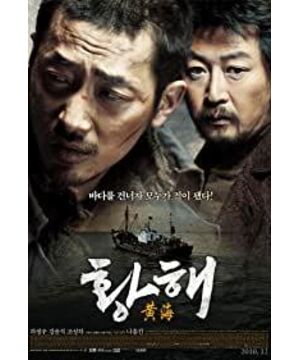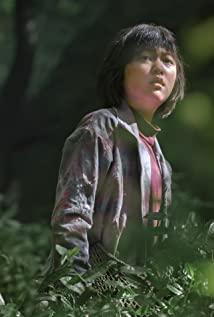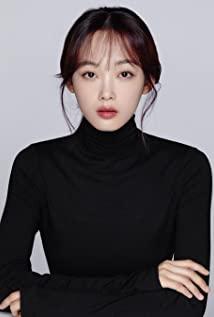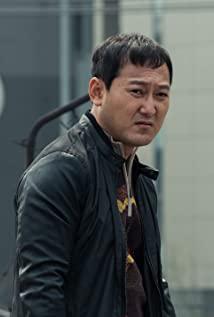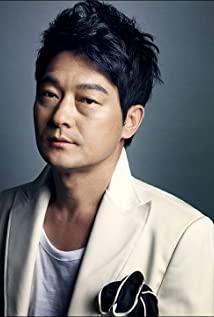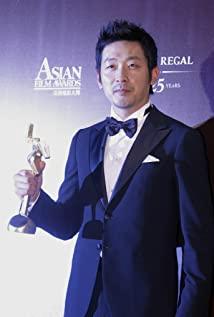Friends who often follow Korean variety shows should know that the Korean entertainment industry still highly respects the period when Hong Kong film noir was prevalent, and a large number of films, including a considerable number of John Woo’s works, are still loved by Korean artists, and such as Jackie Chan, Leslie Cheung, Chow Yun-fat and others are all idols in the Korean entertainment industry.
Regarding the inheritance of Korean film noir to Hong Kong films, in addition to the two most classic violent aesthetics of John Woo's style and Seven Little Fortunes, the relatively new ones that have entered the 21st century are Galaxy-image style, Liu Weiqiang style and Mai Zhuang style. The works are imitated with exquisite skill. However, other relatively niche routines are actually involved. Among them, Mr. Deng Yancheng, the "first director of crime themes" who has directed "Doctor Lamb", "Weak Kill", and "The Confidential File of Wushu", is also the object of study. .
South Korea’s creative themes are actually quite open, and filmmakers have considerable creative freedom—this may be regarded as South Korea’s rapid development of cultural industries and the embodiment of the basic national policy of promoting the growth of the country’s soft power. Therefore, the political criticism and dissatisfaction with government policies, which are rarely seen in other countries' films, are basically mentioned in every Korean crime film, and the true events of the perverted murder cases that are hidden from other countries are adapted. In movies, basically every case in Korea has been turned over and over and over and over, and two or three of them have been filmed.
It can be seen that this is a very suitable environment for Deng Yancheng's works: to reflect extreme human nature with extreme violence, and then use tragic images to challenge the audience's tolerance limit. But in fact, most of the black works in Korean films are still fast food under consumerism. They are accustomed to using intense speeding cars and exaggerated gun battles to complete a commercial action film wrapped in criminal sugar, while serious crime works, In fact, there are very few. Even if you count several adaptations of the three major unsolved cases in South Korea, except for "Memories of Murder", which is so outstanding that people have nothing to say, and "Children" and "The Guy's Voice" are almost meaningless. "I Am a Murderer" is a typical thriller action theme.
If you simply consider the display of violence and the disclosure of human nature in serious crimes, if you choose it among Korean film directors (choose in Chinese, maybe I have to choose Wen Ziren, after all, the director's work "The Chainsaw"), I think it has to be the first Tyluo Hongzhen - This is a filmmaker who has been brought up by his mother to watch violent movies since he was a child. In fact, he is really not allowed to see the works of director Deng Yancheng. Aside from the erotic and bloody additional elements of Deng Yancheng's work as a third-level film, its core seems to be further inherited and carried forward by Luo Hongzhen.
Thinking about 2016, Luo Dao, who had been dormant for a long time and bounced tickets many times, finally ran out with his new work "The Cry" (I don't know if it was a translation problem, or it was called "Gucheng"), thinking about putting his two together. The feature film has been brushed again, and I have to take it out and write something.
"The Chaser"
Before "The Chaser", Luo Hongzhen had completed two short films: "Perfect Red Snapper Cuisine" and "Hate", the second work "Hate", so far no film source has been found, so Not much to talk about. But the exceptionally excellent "Perfect Red Snapper Dishes" has already represented some of the colors that Luo Hongzhen's work must have: cruelty, violence, paranoia and dark humor.
These kinds of colors are mixed together to produce a Cult that belongs to Luo Hongzhen, and it also brings him honors such as the Best Film Award at the Short Film Festival and the Best Short Film Award at the Bell Award. And when this kind of Cult was brought into his first feature film, it showed a certain black quality of serious crimes - the superficial exaggerated obsession expressed by postmodern methods, Turning to realism, there is a deeper exposition of humanity.
From the poster of this film, it is not difficult to see that this film probably also has the meaning of a battle between the pros and cons in John Woo’s film, and from some perspectives, the focus of this film is indeed all due to the two protagonists. shape. The protagonist played by Kim Yoon-seok looks a bit like Choi Min-sik in "Old Boy", that is, it has a considerable degree of roughness: vulgar, savage, and perverse - it seems to be the material for playing the villain, but in fact , in front of a pimp, clutching the things in his wallet, doing explosive things: perhaps the only conscience is the respect for the personality and freedom of prostitutes.
The protagonist's initial pursuit is supposed to be tense and anxious, but these are just anger due to the loss of interests. And after gaining a deeper understanding of the event, the pure pursuit of interests has changed to self-salvation of morality based on guilt-and these behaviors are finally expressed by violence and violence. This kind of violence is indistinguishable. It faces all classes. This kind of violence originates from the obsession in the heart, and finally gives the characters the strength to fear life and death.
Relatively speaking, Ha Zhengyu's character has the pure charm of the villain in Mr. Deng Yancheng's works: thorough psychopathic, brutal behavior, and merciless ferocity - even if Luo Hongzhen relies on the role of equal weight, Using their confrontation to add the content of the game of human nature may make the work itself much higher than Deng Yancheng, but if the violence of irrational people needs to be shown, characters like Ha Zhengyu still need to exist. This character may be relatively more visual, apart from the intuitive and stimulating violence, the contrast between the character's delicate and weak face and the perverted behavior of iron drills smashing the skull can give the audience a visual shock. In the film, it is pointed out that the establishment of Ha Jung Woo's character behavior should originate from the lack of sexual function, so through another more intense "insertion", sexual intercourse is symbolically completed to obtain orgasm - this must be regarded as a mental illness , even the product of brain disease, but it is still human nature after all, using blood and broken arms and stumps to reflect some kind of abnormal human nature.
In fact, in the whole work, what is put in a prominent position should be the attention to social issues: from the core story of the whole work, that is, the attention to the "street girl", and the police law enforcement ability shown in the progress of the story Underneath, incompetence due to judicial process and means. The whole film always has another case as a horizontal comparison of the perverted murder case as the core story: "The dung incident", the description of the whole case always has a realistic approach, which is mainly based on the comics of the parties involved, as well as exaggerated reflections by the media. . Compared with "splashing dung", the murder incident seemed extremely deep and serious, but he, who was really a big incident, didn't care about him at all - this was also a kind of pungent sarcasm. These are the qualities that Luo Hongzhen said he did not have and could not show in the short film era, but perhaps there is also the reason why Han Ying pays attention to realistic films.
In fact, the perverted murderer and the chasing police are actually just very old-fashioned themes. Strong emotional ups and downs, intense and comfortable rhythm, finally make this work the best crime directorial debut in Korean film history.
"Yellow Sea"
"Yellow Sea" is a better movie than "The Chaser".
Although it is no longer a more popular urban crime theme, whether it is a more ups and downs wonderful story, or a more thought-provoking human violence, it has the "Chasers" unable to Comparable charm.
Compared with the extreme performance of human nature in "The Chaser", sexual perverted characters are selected, and the madness under "irrationality" is the core. "Yellow Sea" pays more attention to the display of inner violence under rational conditions, and then exerts force to show the real human game between characters, showing more profound violence - this kind of violence is not pathological, not crazy, He is the result of every character being forced step by step in the environment. It is calm and cold to the bone. They are about attacking and hunting instincts. It's a display of the desire to destroy, to destroy, it's real violence. It is the most extreme part of human nature in the true sense, not the perverted madness of a mental patient mixed with mating and sexual desire.
It's no wonder that Luo Hongzhen's wife, who is a loyal fan of violent movies, said nothing after watching "The Chaser", but was full of praise for "Yellow Sea" and said to his son: "I finally realized the violence in your heart.
It doesn't sound like a good thing to say - especially when the old lady said it to her son... All
the characters in the film are gradually developing from human to non-human: Take Ha Zhengyu as an example, he has been shot since he was shot. It will hurt, it will collapse because of the pain of running away, it will shrink back because of the fierceness of the other party, and it will be out of anger because of betrayal. Stubbornly looking for a wife and the madness after everything is broken, it can be said that it is the alienation after repeated life and death confrontation, and the helplessness of survival in a desperate situation, or it can be seen as being betrayed but still unable to penetrate the shady scene, it is ultimately attributable to anger and curiosity. Heart turned into cold-blooded ruthlessness. But in the end, what embodies the deepest in all of this is the violence and blackness that the characters hide in the deepest heart.
The most profound manifestation of inner violence and blackness is not the protagonist - after all, it is only due to livelihood and obsession. The blackness of the others, Jin Yunshi and President Jin, was due to money and interests. Jin Yunshi is an outlaw, and for the sake of profit and survival, he has carried forward his own military characteristics to the extreme. From axes, awl knives, and even non-artificial objects, there are more or less bones and sticks that symbolize the human body and human nature. Whenever these fall into the hands of Jin Yunshi, who has no life, and take the lives of countless social scum, that kind of stripped of goodness Evil morality, regardless of the so-called humanistic concern, abandons pity and disgust for blood, and is just rationalized violence for profit or revenge, which is enough to make people extremely panic.
President Jin needless to say, although he is only a businessman, he condones violence, uses violence secretly, and shows the most grotesque side with a sanctimonious face, but with the craziest face.
In fact, the violence in the film, the violence that is born from obsession, and the obsession in the final feedback is even more frightening: everyone is fighting for their lives, either in the process of killing or being killed. This makes them feel no pain, no fatigue, and even the fatal wounds are just casual. In order to survive, everyone is choosing the most extreme lifeline to save themselves. They don't care, but it is enough to make people shudder. But they went to extremes, finally broke the last string, and finally fell into the bottomless abyss.
There are no good people in the film, most of them are bastards. The police are very official, they just look at it from a perspective. They have no specific moral inclination, or the biggest difference between them and the vase, or they can only use the functions of the police to promote the development of the plot, but they can not intervene in the plot, which is complicated and contradictory. Conflict - In fact, the police are still incompetent. As a violent law enforcement unit, their search and arrest efforts are far inferior to that of a gang of gangsters.
In fact, the realism in "Chasers" has also continued into "Yellow Sea": incompetent police, cowardly society, and a series of issues such as property rights disputes, money laundering, etc., are torture and criticism of the chaos of capital in South Korea . It involves quite a lot of the word "Korean" - in our eyes, the Korean Peninsula actually has only one ethnic group called "Korean", that is, both the north and the south should be Koreans, but in the film "Korean" refers to those who defected from the North. Korean. These discussions are nothing more than the North-South issues that are often discussed in Korean films, but this time it is different. It is more about immigrants and stowaways, about "North Korean defectors" and North Koreans living in Northeast China, and about The performance and concern of their individual as a marginal person in society.
Having said that, what I really want to know is that Director Na Hong-jin, who dared to use the word "bangzi" in Korean films, did he think that the word "bangzi" simply refers to North Koreans? Or is it referring to the ethnic Koreans of Jilin Yanbian Autonomous Prefecture? Or did he clearly know that "stick" actually refers to everyone on the entire Korean peninsula?
In fact, the part of personal interest in the film is more or less the performance of the city. Under the lens of Luo Hongzhen, every city, whether it is gorgeous, rich, or dirty, or dead and desolate, seems to be the same. It’s that narrow and violent gray space—whether it’s Yanji City, Seoul, North Korea’s countryside, South Korea’s ports, docks, or suburbs, they seem to be not very different, even quite similar. This can be said to be the temperament of his films, which is ultimately expressed in the common characteristics of the city.
Suddenly I thought, it is quite interesting that Luo Hongzhen has made two works, and he did not change the actors very much. He Zhengyu and Jin Yunshi have always played the pros and cons. In other words, Ha Jung-woo, who seems to be a little smoother, played a more convincing, wolf-like, thin man with explosive power after he played a pervert in "The Chaser". And Jin Yunshi, who is more like a villain, has to return to his place after being a morally resigned criminal policeman, playing the savage and powerful underworld boss.
Another interesting point is that Guo Daoyuan played a judo champion, followed by a kendo player, but in the end they were all just killed by a group of ruthless thugs - this comparison actually reflects to a certain extent It shows the power of human violence, but the contrast shows some kind of black humor that belongs to the characters and creators. Although it is not enough for outsiders and is known to moviegoers, it is enough to remind us of "The Perfect Red Snapper". The madness of chopping hands and eyes in "Fish Cooking", and the grotesque and funny behavior of reporters and politicians in "Chasers" - indeed black humor, and it can be regarded as controlling the darkest characteristics of film noir.
View more about The Yellow Sea reviews


